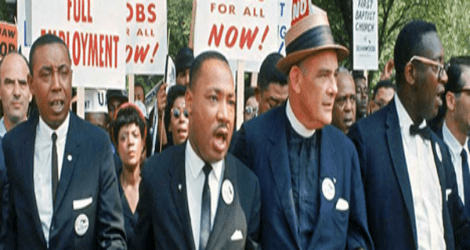 View and print as PDF
View and print as PDF

Recent months have witnessed a remarkable explosion of protest in the name of social and, specifically, economic justice. The Occupy Movement has raced to the forefront of our national consciousness by staking out two fundamentally democratic principles: (1) public space is for the public, and (2) free speech includes the freedom to criticize the prevailing social order. This movement began rather modestly in Manhattan with the Occupy Wall Street chapter, but quickly spread across the nation, fueled by increased media coverage and by misguided and unnecessary police violence. Because the movement began there, and because it is symbolically significant for the movement’s message, I will refer to the whole movement as “Occupy Wall Street” by means of its Twitter hashtag, #OWS.
What is #OWS’s message? The chattering class[1] has worn out many keyboards in the attempt to understand this phenomenon. Although understanding has increased, it remains common to find folks committed to the notion that #OWS has no message. That is false. #OWS’s message is remarkably simple: “capitalism is broken, and it has broken our politics as well.”
___________________________________________
#OWS constitutes a revolt against what any truly democratic system of government ought to reject, namely, the concentration of vast economic resources in the hands of the few and the consequential concentration of political influence in those same hands.
___________________________________________
The fuel that launched #OWS is the deeply held conviction, backed up by innumerable studies and statistical data points, that wealth distribution within the United States is increasingly unjust, and that this concentration of wealth in the hands of the few (in #OWS nomenclature, “the 1%”) has produced a breakdown in the political process, marginalizing the political voice and will of the many (in #OWS nomenclature, “the 99%”). In all this, #OWS’s motivation and message seems to echo that of Abraham Lincoln in his address at Gettysburg, when he called the nation to join him in his resolve “that government of the people, by the people, for the people, shall not perish from the earth.”
At the end of the day, #OWS constitutes a revolt against what any truly democratic system of government ought to reject, namely, the concentration of vast economic resources in the hands of the few and the consequential concentration of political influence in those same hands. #OWS is the conscience of our democracy, which has increasingly lapsed into an oligarchy of un-democratic privilege.
Reformed Theology and #OWS
Although there is much within the Christian tradition that would incline one toward support of #OWS, there are certain distinctives within the Reformed theological tradition that provide an extra push in this direction.
Ethics
Perhaps most pertinent is the tradition’s ethical emphasis. As John Leith once noted, the Reformed tradition insists “that the Christian is not only a forgiven person but an ethical person. This emphasis is reflected in the theology, worship, and polity” of Reformed churches.[2] Reformed Christianity’s ethical focus finds its clearest theological expression in what John Calvin called “the third and principle use” of the Law (specifically, the Ten Commandments or Decalogue).[3] Rather than serving simply to restrain evil or to drive non-Christians to despair and thus conversion, Reformed Christianity teaches that the Law also provides believers with instructions describing the sort of life that God wants God’s children to live.
This Reformed principle points to the close relationship between what theologians call the “two tables” of the Law, that is, the Decalogue’s early commandments concerning life with God and its latter commandments concerning life in community. Jesus built on this twofold aspect when he identified the two greatest commandments: “You shall love the Lord your God with all your heart, and with all your soul, and with all your mind, and with all your strength . . . You shall love your neighbor as yourself” (Mk 12.30-1).[4] This passage highlights the inextricable link between the two tables of the Law, between love of God and neighbor. Any activities (worship, prayer, etc.) or dispositions that express or profess love of God are mere resounding gongs when they are divorced from active love of neighbor. In this same vein, Matthew 25.34-40 teaches that active love for one’s poor and oppressed[5] neighbors is paradoxically identical with love of God. For my own part, I am convinced that the Reformed tradition’s ethical emphasis implies that a Reformed Christian ought to support a movement that aims to undermine the wealth and political privilege enjoyed by the few that keeps many in our nation poor and oppressed.
Covenant
Built into the tradition’s very fabric, this ethical emphasis finds its theological foundation in the deeply Reformed idea of covenant. Indeed, this idea is so significant in the Reformed tradition’s theological history that there are branches of that history described as “Covenant theology.” At the most basic level, “covenant” describes how God and humanity relate. God stands on the one side, a superior party, and enters into relationship with humanity on the other side, an inferior party. This relationship involves mutual responsibility, and is best encapsulated in God’s statement to the Israelites: “I will . . . walk among you and be your God, and you shall be My people” (Lv 26.12). The covenant depends and is built on God’s saving activity, which gives God the right to demand obedience—and ethical action—from those whom God has saved.
___________________________________________
These are not recommendations for an individual’s pious attitudes and charitable activities. Justice must be established at the gate, where the elders sat in ancient towns and cities to hear disputes and render judgments.
___________________________________________
This covenantal relationship extends to all humanity. Although much of the Reformed tradition has either explicitly or implicitly limited covenant membership to those who actively share in the Christian faith, there is also a tendency within the tradition (e.g. Heinrich Bullinger) to understand the covenant as a relationship that God has with all of humanity, not just with believers. John Riggs helpfully explains Bullinger’s position as follows: “God is disposed kindly toward all humankind, wanting their salvation and thus wanting them to take up responsibly their side of the divine-human relationship.”[6] Reformed theology, therefore, pushes us to recognize that those who actively promote the love of neighbor have begun to assume covenantal responsibility before God, even if they have not yet awakened to faith and explicit love of God. Movements such as #OWS thus point Reformed Christians back to their own covenantal responsibility not only to practice love of God, but also and inescapably to practice love of neighbor.
Continue reading on the next page…






Unbound Social